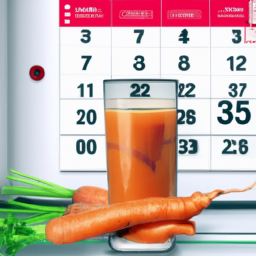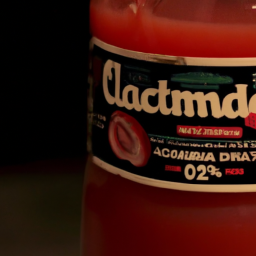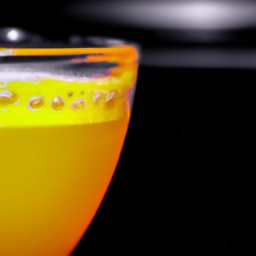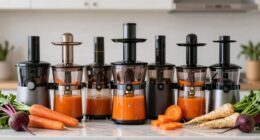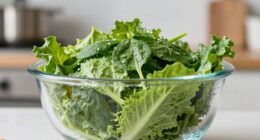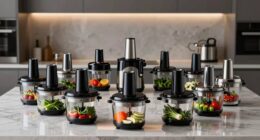I enjoy consuming carrot juice, yet I’ve constantly been curious about its freshness duration. After all, ensuring that I’m drinking a healthy and safe liquid is important to me. Being aware of how long carrot juice remains fresh is critical, particularly when purchasing it in large quantities or preparing it yourself.
Carrot juice is a great source of vitamins and minerals, but it can quickly spoil if not stored properly. In this article, I’ll explain the factors that affect carrot juice’s freshness, how to store it, and how to tell if it has gone bad. By the end, you’ll know exactly how long carrot juice is good for and how to make the most of its lifespan.
Let’s get started.
Key Takeaways
- Freshly made carrot juice lasts up to 3 days in the fridge, while store-bought carrot juice lasts up to 2-3 weeks in the fridge.
- Proper storage of carrot juice includes keeping it in a tightly sealed container in the fridge at 40°F or below to maintain freshness and prevent spoilage.
- Freezing is an effective way to preserve carrot juice for longer periods of time, and using lemon juice before freezing helps maintain its natural color and flavor.
- Drinking expired or spoiled carrot juice can cause food poisoning and trigger allergic reactions, so it’s important to practice proper food safety and hygiene techniques and avoid consuming these products if you have a known allergy.
The Importance of Knowing Carrot Juice’s Shelf Life
You need to know how long carrot juice’s shelf life is so you don’t end up drinking spoiled juice and getting sick. It’s essential to take note of the expiration date of the carrot juice you bought in the store or the date you juiced it yourself.
Drinking expired carrot juice can cause food poisoning, which can result in nausea, vomiting, and diarrhea. Aside from the potential health risks of drinking expired carrot juice, you might also lose the benefits that it provides.
Carrot juice benefits include improving your eyesight, boosting your immune system, and aiding digestion. To ensure that you get the most out of your carrot juice, make sure to use proper juicing techniques and to consume it within its shelf life.
With that said, let’s dive into the shelf life of carrot juice.
The Shelf Life of Carrot Juice
When it comes to carrot juice, knowing its shelf life is important for both health and budget reasons.
As someone who loves to make fresh juice at home, I want to ensure that I’m consuming it at its peak freshness and nutrition.
On the other hand, if I decide to purchase store-bought carrot juice, I want to be aware of how long it’ll last in my fridge to avoid waste and spoilage.
Freshly Made Carrot Juice
Freshly made carrot juice typically lasts for up to three days in the refrigerator, according to studies. This is because freshly made juice is more susceptible to bacterial growth than store-bought juice due to the lack of pasteurization. However, there are numerous benefits to consuming freshly made carrot juice.
Here are some benefits of consuming freshly made carrot juice:
- Rich in nutrients: Freshly made carrot juice contains a high amount of vitamins A, C, and K, as well as potassium and folate.
- Boosts immune system: The antioxidants in carrot juice help to strengthen the immune system and protect against free radical damage.
- Best time to drink: The best time to drink carrot juice for maximum health benefits is in the morning on an empty stomach.
Moving on to store-bought carrot juice, it’s important to note that the shelf life of this type of juice is longer due to the pasteurization process.
Store-Bought Carrot Juice
Store-bought carrot juice may not be as nutritious as freshly made juice, but it still provides a convenient and accessible way to incorporate vitamins and antioxidants into your diet. Plus, it can last longer than homemade juice if stored properly. According to the USDA, unopened store-bought carrot juice can last up to two to three weeks in the refrigerator, while opened juice should be consumed within seven to ten days.
When purchasing store-bought carrot juice, make sure to check the label for added sugars or preservatives. Look for organic options that are cold-pressed and free from added ingredients. While homemade carrot juice may be the best option for optimal nutrition and freshness, store-bought juice can still provide health benefits in a convenient way. To enhance the taste and nutrition of store-bought juice, try mixing it with other fruits and vegetables or adding a splash of lemon juice.
Factors that affect carrot juice’s freshness include storage temperature, exposure to light and air, and the quality of the carrots used. With proper storage and handling, carrot juice can provide a delicious and nutritious addition to your diet. If you’re interested in making your own carrot juice, there are many homemade carrot juice recipes available online that are easy and delicious.
Factors that Affect Carrot Juice’s Freshness
The shelf life of carrot juice varies depending on factors such as temperature, light exposure, and whether or not it has been opened, with unopened bottles lasting up to two months in the fridge. Factors affecting carrot juice’s freshness also include exposure to air and the level of acidity.
When carrot juice is exposed to air, it may oxidize and lose its nutrients. Furthermore, if the juice has a high level of acidity, it may spoil faster. To extend the shelf life of carrot juice, it is important to store it properly.
The best way to store carrot juice is to keep it in a tightly sealed container in the fridge at a temperature of 40°F or below. It is also important to keep the juice away from light sources, as light exposure can cause the juice to spoil faster. Additionally, it is recommended to consume the juice within a week of opening the bottle.
If the juice has been stored improperly or has exceeded its shelf life, it may exhibit signs of spoilage such as a sour smell, discoloration, or a slimy texture. In the next section, we will discuss these signs of spoiled carrot juice in more detail.
Signs of Spoiled Carrot Juice
You don’t want to drink spoiled carrot juice, as it can make you sick and ruin your day. There are a few telltale signs that your carrot juice has gone bad, including changes in color, taste, and smell. Here’s a handy table to help you identify when your carrot juice has spoiled:
| Signs of Spoiled Carrot Juice | Description |
|---|---|
| Color | The juice may appear darker or lighter than usual, or it may have a cloudy appearance. |
| Taste | The juice may taste sour or off, and it may have a bitter aftertaste. |
| Smell | Spoiled carrot juice has a strong, unpleasant odor that is hard to miss. |
If your carrot juice has any of these signs, it’s best to throw it out and not risk getting sick. However, there are some ways you can use spoiled carrot juice. For example, you can use it as a natural dye for fabrics or Easter eggs. Carrot juice is also rich in nutrients, so you can use it as a natural fertilizer for your plants. Despite being spoiled, the health benefits of carrot juice are still present, so it’s not a complete waste.
With all this in mind, it’s important to know how to store carrot juice properly to avoid spoilage.
How to Store Carrot Juice
When it comes to storing carrot juice, I always make sure to refrigerate it as soon as possible. This helps to slow down the growth of bacteria and keep the juice fresh for a longer period of time.
If I know I won’t be able to drink all the juice within a few days, I’ll freeze it in an airtight container to preserve it even further.
Refrigeration
To keep your carrot juice fresh, refrigerate it as soon as possible after juicing. Refrigeration is one of the best ways to preserve carrot juice for a longer time. It slows down the growth of bacteria and other microorganisms that can cause spoilage. Additionally, refrigerating carrot juice can help retain its nutrients and flavor for an extended period.
There are alternatives to refrigeration for preserving carrot juice, such as freezing or using preservatives. However, these methods can affect the taste and quality of the juice. Freezing can cause the juice to separate and change in texture, while preservatives can alter the flavor and add unwanted chemicals. Hence, refrigeration remains the best option for storing carrot juice.
In the next section, we’ll discuss how to freeze carrot juice for long-term storage.
Freezing
Now that we’ve discussed how refrigeration can extend the shelf life of carrot juice, let’s take a look at another method of preservation: freezing. Freezing is an effective way to keep carrot juice fresh for longer periods of time, and it’s a great option for those who want to stock up on the juice for future use. However, it’s important to know the proper freezing and thawing techniques to ensure that the juice retains its flavor and nutritional value.
When freezing carrot juice, it’s important to use an airtight container to prevent freezer burn and to maintain the juice’s freshness. Before freezing, make sure to leave some headspace in the container to allow for expansion as the juice freezes.
When it’s time to thaw the juice, it’s best to do so slowly in the refrigerator or by placing the container in a bowl of cold water. Avoid thawing the juice in the microwave or at room temperature, as this can cause the juice to separate and lose flavor.
To ensure that your frozen carrot juice stays fresh and nutritious, it’s important to properly store and thaw it. But what about using airtight containers? Let’s take a look at why this step is crucial in preserving carrot juice.
Using Airtight Containers
Using airtight containers is crucial for preserving the flavor and nutritional value of your frozen carrot juice, so don’t forget to seal it up tight! Vacuum sealing is a great option for those who want to keep their carrot juice fresh for a longer period of time. This method removes all the air from the container, preventing oxidation and freezer burn.
Another option is using glass containers with tight-fitting lids. Glass is a non-reactive material that won’t affect the taste or quality of your juice. Just make sure to leave some headspace at the top of the container to allow for expansion during freezing.
When it comes to extending carrot juice’s lifespan, there are a few tips to keep in mind. One way is to add some lemon juice to your juice before freezing it. The citric acid in the lemon juice helps to maintain the juice’s natural color and flavor.
Another tip is to always store your carrot juice at the back of the freezer, where it’s coldest and most stable. By following these simple steps, you can enjoy your frozen carrot juice for up to 8 months!
Tips for Extending Carrot Juice’s Lifespan
You can easily extend the lifespan of your carrot juice by following a few simple tips. First, consider using preservatives such as lemon juice or apple cider vinegar to help prevent spoilage. These natural preservatives can help to increase the acidity of the juice, making it less hospitable to bacteria.
Secondly, try reusing your carrot pulp to get the most out of your ingredients. Instead of throwing away the pulp after juicing, consider using it in recipes such as soups, stews, or even baked goods. This not only helps to reduce waste but also allows you to benefit from the nutritional content of the pulp.
By following these tips, you can ensure that your carrot juice stays fresh for longer and that you get the most out of your ingredients. But how can you tell if your carrot juice has gone bad? Let’s explore that in the next section.
How to Tell If Carrot Juice Has Gone Bad
If your carrot juice has spoiled, it’ll have a distinct sour smell and taste. Trust your senses and don’t consume it if it smells or tastes off. Additionally, look for any changes in color or texture. Spoiled carrot juice may appear cloudy or have a thicker consistency than fresh juice.
To prevent carrot juice from spoiling quickly, store it in the refrigerator and consume it within 3-4 days. If you have extra juice that you can’t finish within that time frame, consider freezing it in an airtight container. Frozen carrot juice can be used in smoothies or as a base for soups or sauces.
However, it’s important to note that expired carrot juice can pose health risks if consumed. In the next section, we’ll explore the potential dangers of drinking spoiled carrot juice.
Risks of Consuming Spoiled Carrot Juice
As someone who’s experienced foodborne illnesses in the past, I know firsthand how important it is to be cautious about consuming spoiled food.
Spoiled carrot juice can potentially lead to food poisoning. This can cause symptoms such as nausea, vomiting, and diarrhea.
Additionally, those with carrot allergies should also be careful. Consuming spoiled carrot juice can trigger an allergic reaction.
Foodborne Illnesses
Believe it or not, getting sick from your favorite food can actually be a great way to lose weight, but foodborne illnesses are no joke and can have serious consequences for your health.
To prevent foodborne illnesses, it’s important to practice proper food safety and hygiene techniques. This includes washing your hands before handling food, cooking meat to the appropriate temperature, and storing food at the proper temperature.
It’s also important to be aware of common pathogens that can cause foodborne illnesses, such as Salmonella and E. coli.
If you do become sick from consuming contaminated food, the symptoms can range from mild to severe and can include nausea, vomiting, diarrhea, and fever. In some cases, foodborne illnesses can even be fatal. To avoid these risks, it’s important to take preventative measures and be cautious of the food you consume.
With that being said, it’s important to note that not all illnesses are caused by consuming spoiled food.
Up next, we’ll discuss the risks and symptoms associated with allergic reactions.
Allergic Reactions
Allergic reactions can be incredibly dangerous, so it’s important to be aware of the symptoms and take necessary precautions. Some people may experience an allergic reaction to carrot juice, which can cause symptoms ranging from mild to severe. Here are some things to keep in mind when managing allergic reactions:
-
Cross reactivity risks: Some people who are allergic to other foods may also be allergic to carrots or carrot juice. This is known as cross reactivity, and it’s important to be aware of this risk if you have other food allergies.
-
Symptoms to watch for: Symptoms of an allergic reaction to carrot juice can include itching, swelling, and difficulty breathing. If you experience any of these symptoms, seek medical attention immediately.
-
Prevention: If you have a known allergy to carrots or carrot juice, it’s important to avoid consuming these products altogether. Be sure to read food labels carefully and ask about ingredients when eating out.
It’s important to take allergic reactions seriously and take steps to manage them. If you’re unable to drink carrot juice due to an allergy, there are alternatives available. Let’s explore some of these alternatives in the next section.
Alternatives to Drinking Carrot Juice
Looking for a change of pace from sipping on carrot juice? Try mixing up a fruity smoothie instead. There are plenty of juice alternatives that offer great nutritional value and can be just as tasty as carrot juice. Check out this table for some ideas:
| Fruit | Nutritional Benefits | Recipes |
|---|---|---|
| Berries (blueberries, raspberries, strawberries) | High in antioxidants and vitamin C | Berry Blast Smoothie: Blend 1 cup mixed berries, 1 banana, 1 cup almond milk, and 1 scoop protein powder |
| Pineapple | Contains digestive enzymes and vitamin C | Pineapple Paradise Smoothie: Blend 1 cup frozen pineapple, 1/2 cup coconut milk, 1/2 banana, and 1 scoop vanilla protein powder |
| Mango | High in vitamin A and C | Mango Tango Smoothie: Blend 1 cup frozen mango, 1/2 cup orange juice, 1/2 cup Greek yogurt, and 1 scoop vanilla protein powder |
| Kiwi | Rich in vitamin C and fiber | Kiwi Green Smoothie: Blend 2 kiwis, 1 banana, 1 cup spinach, 1/2 cup almond milk, and 1 scoop protein powder |
As you can see, there are plenty of delicious and nutritious juice alternatives to choose from. By incorporating a variety of fruits into your smoothies, you can provide your body with a range of essential vitamins and minerals. So, if you’re looking to switch things up from carrot juice, give one of these smoothie recipes a try!
Frequently Asked Questions
Can you freeze carrot juice?
Yes, you can freeze carrot juice to preserve its nutrients. Freezing carrot juice can extend its shelf life and make it more convenient for future use. Simply pour the juice into freezer-safe containers and leave some room for expansion.
How long does homemade carrot juice last compared to store-bought?
Homemade carrot juice can last up to 3 days in the refrigerator, while store-bought carrot juice can last up to 2 weeks due to pasteurization. However, homemade juice has more nutrients and no preservatives. Shelf life comparison favors store-bought, but homemade is healthier.
Is it safe to drink carrot juice past its expiration date?
Drinking expired carrot juice is like playing Russian roulette with your health. It’s not worth the risk. Always check the expiration date and discard any juice that’s past it. Safety first.
Can drinking too much carrot juice be harmful?
Drinking excessive amounts of carrot juice can lead to carotenemia, a condition that causes yellowing of the skin. The consumption limit varies based on individual factors. Consult with a healthcare provider for guidance on carrot juice intake to avoid potential side effects.
Are there any health benefits to drinking expired carrot juice?
Drinking expired carrot juice is not recommended as it can lead to food poisoning. The nutritional value and flavor profile decrease over time, just like a flower wilts and loses its fragrance.
Conclusion
So, how long is carrot juice good for? It’s important to know the shelf life of this delicious and nutritious drink to ensure that you’re consuming a fresh and safe product.
According to a study by the Journal of Food Science, carrot juice can last for up to two weeks if stored properly in the refrigerator at a temperature between 33-40°F. However, there are several factors that can affect the freshness of carrot juice, such as exposure to light and air, temperature changes, and the age of the carrots used in the juice.
To extend the lifespan of your carrot juice, it’s important to store it in an airtight container, away from direct light and heat sources. By following these tips, you can enjoy delicious and fresh carrot juice for longer periods of time.
